Abacus Data Poll: Conservatives lead down to 16 as Liberals make gains among younger Canadians
May 24, 2024
From May 16 to 21, 2024 Abacus Data conducted a national survey of 2,415 adults exploring several topics related to Canadian politics and current events as part of our regular national omnibus surveys.
In this edition of our Canadian politics tracking, we report on our usual metrics along with a deep dive to assess what Canadians think a Pierre Poilievre-led Conservative government should and would do if elected.
I was on Power & Politics last night talking about these results:
Vote Intention: Conservatives lead by 16 over the Liberals
If an election were held today, 41% of committed voters would vote Conservatives with the Liberals at 25%, the NDP at 18% and the Greens at 4%. The BQ is at 38% in Quebec.
Since our last survey, the Conservatives are down 2 while the Liberals and NDP are up 1. About a month ago, the gap between the Conservatives and Liberals was 21-points. Today it is 16.
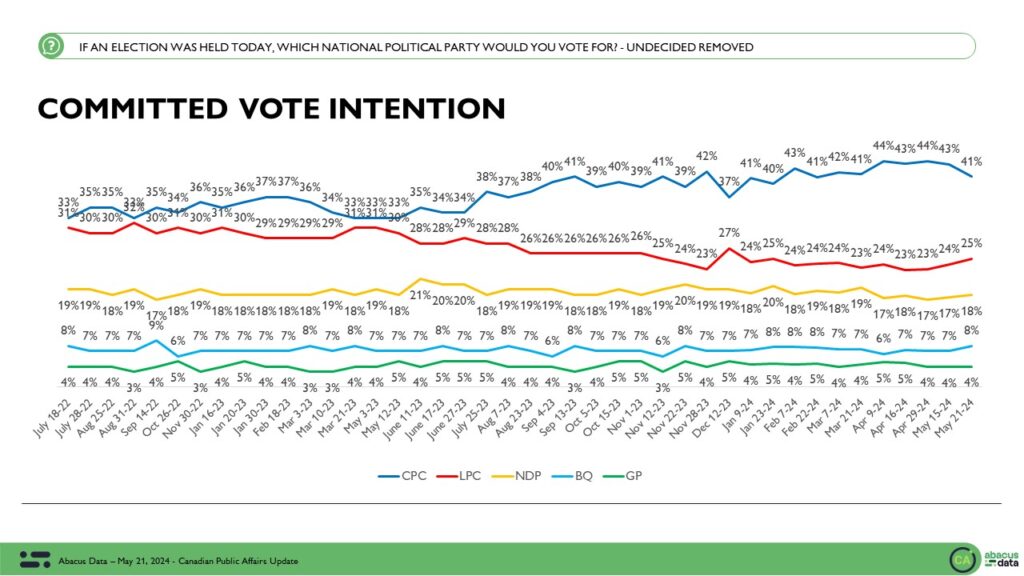
Regionally, the Conservatives are well ahead in the Prairies, lead by 17 in BC and 15 in Ontario. In Atlantic Canada, the Conservatives are 20-points ahead of the Liberals while in Quebec, the BQ is ahead of the Liberals by 12-points with the Conservatives in third at 21%.
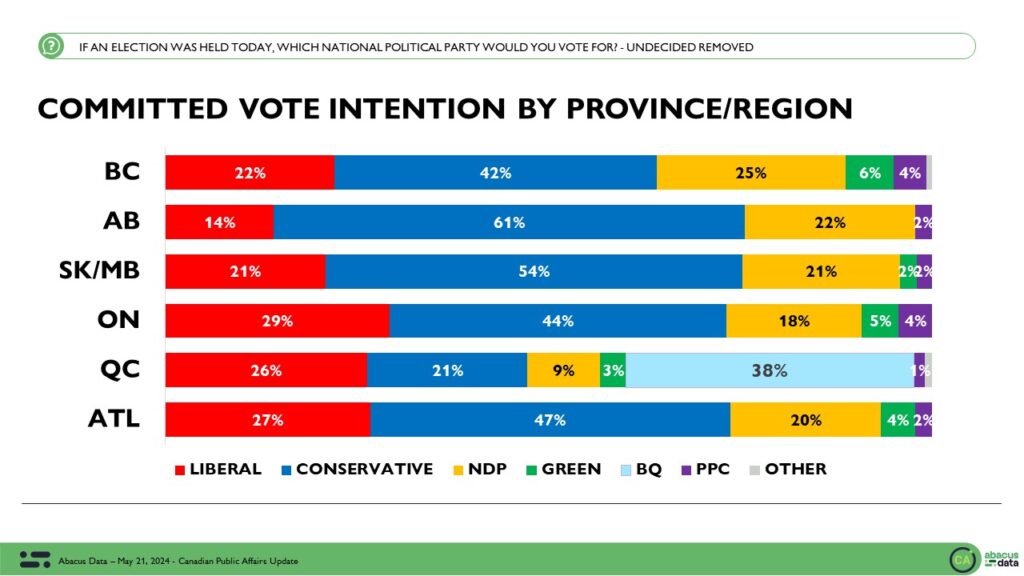
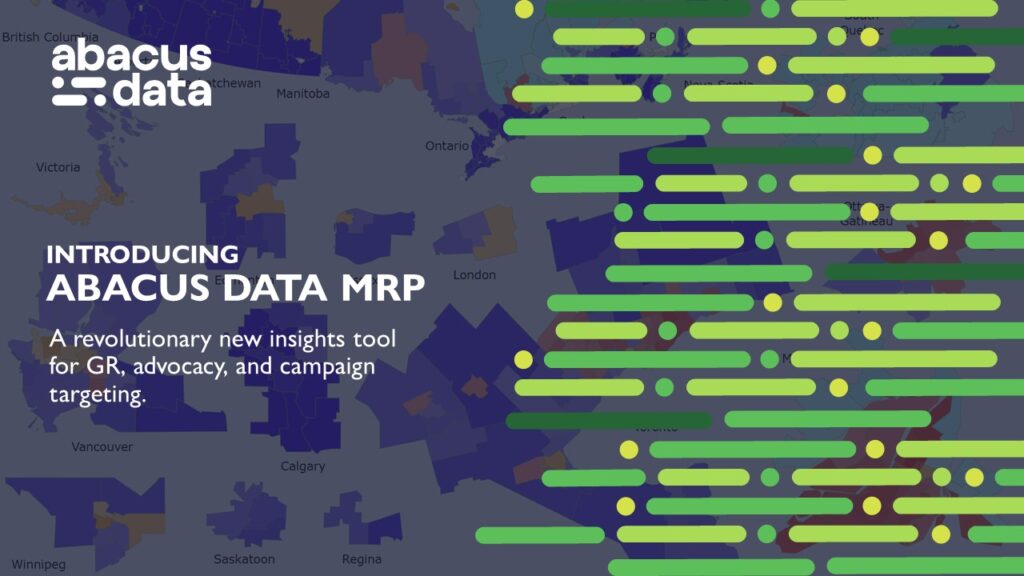
Demographically, the Conservatives lead among Canadians aged 30 and over but among those aged 18 to 29, the gap between the Liberals and Conservatives have closed over the past month. In April, the Conservatives led by 23. Today, it’s 5-points. This is the second survey in a row that we have found Liberal support among younger Canadians to be higher than we have typically seen in the past five months.
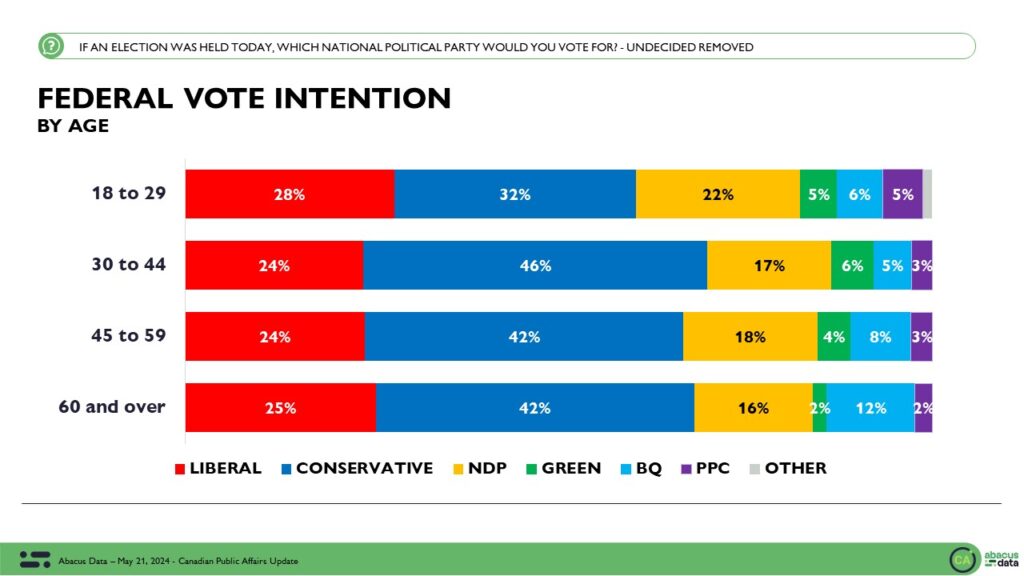
Although there has been a small shift voting intentions, there’s been little change in the size of each party’s accessible voter pools. Today, 51% are open to voting Conservative (down 2), 41% are open to voting NDP (up 1) while 40% are open to voting Liberal (up 3 since April).

No major shifts in other metrics.
Beyond vote intention, there hasn’t been much change in overall impressions.
There has been no shift in perceptions about the direction of the country. 58% disapprove of the job performance of the federal government compared with 27% who approve.
54% of Canadians say they want to see a change in government and believe there is a good alternative while 17% believe that Justin Trudeau and the Liberals deserve to be re-elected. All of these measures are within a narrow band we have measured for the past few months.
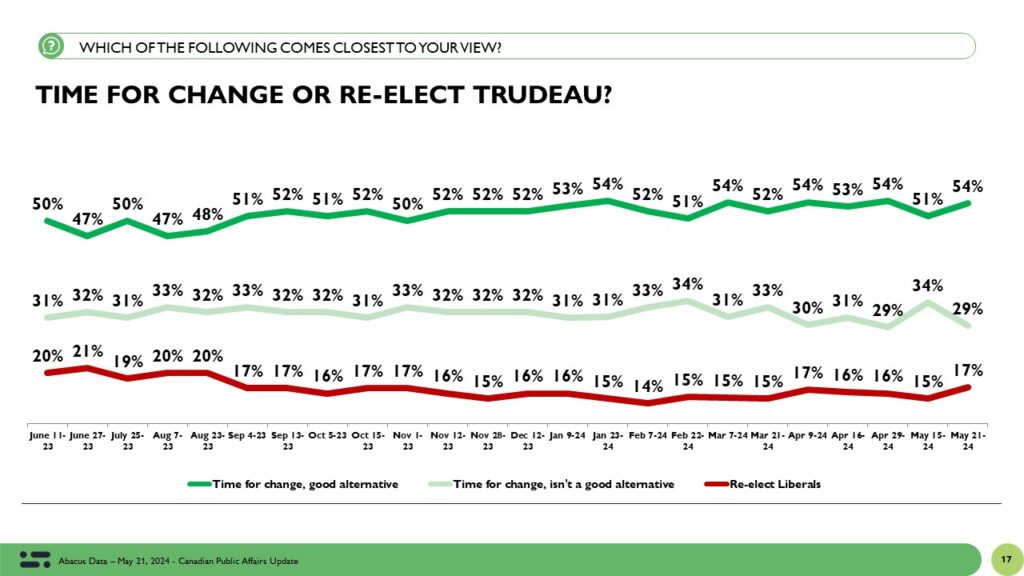
Impressions of Justin Trudeau are static. 58% have a negative impression of the Prime Minister and 26% have a positive view for a net score of -32.
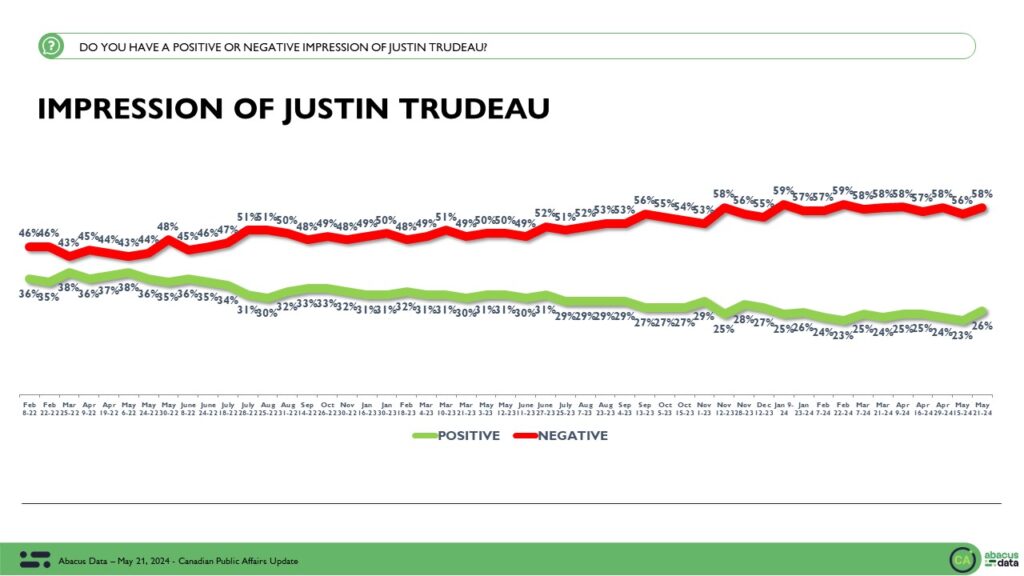
In contrast, impressions of Pierre Poilievre have deteriorated slightly in the past few weeks. Today 38% have a positive impression while 37% have a negative impression for a net score of +1.
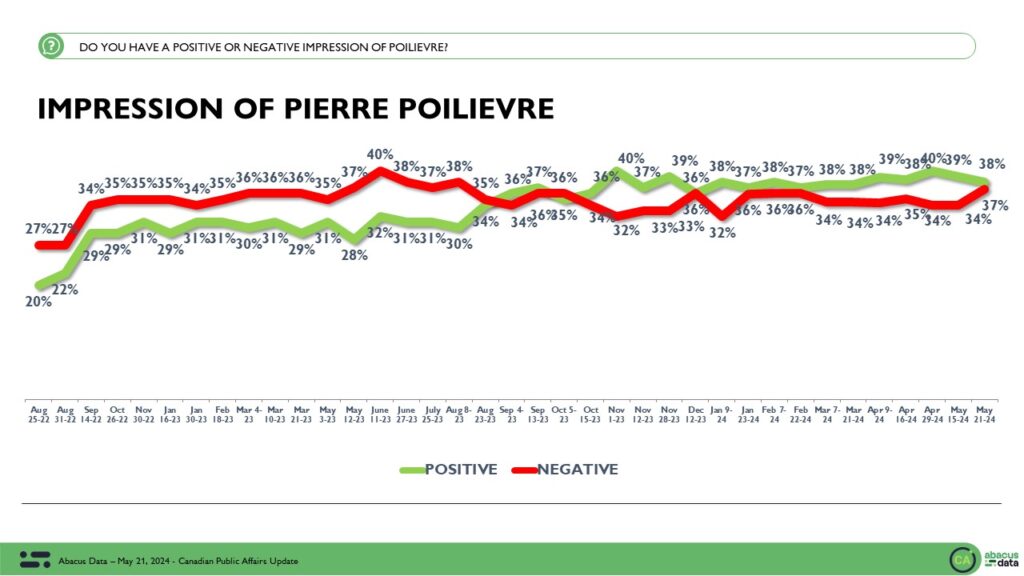
Feelings about NDP Leader Jagmeet Singh have improved with 35% having a negative view and 32% having a positive view for a net score of -3.
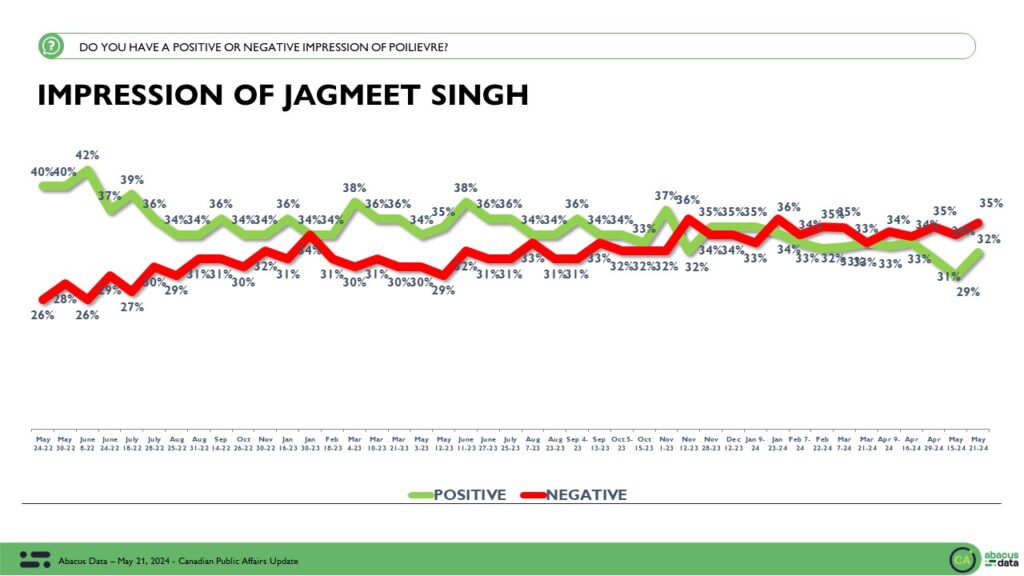
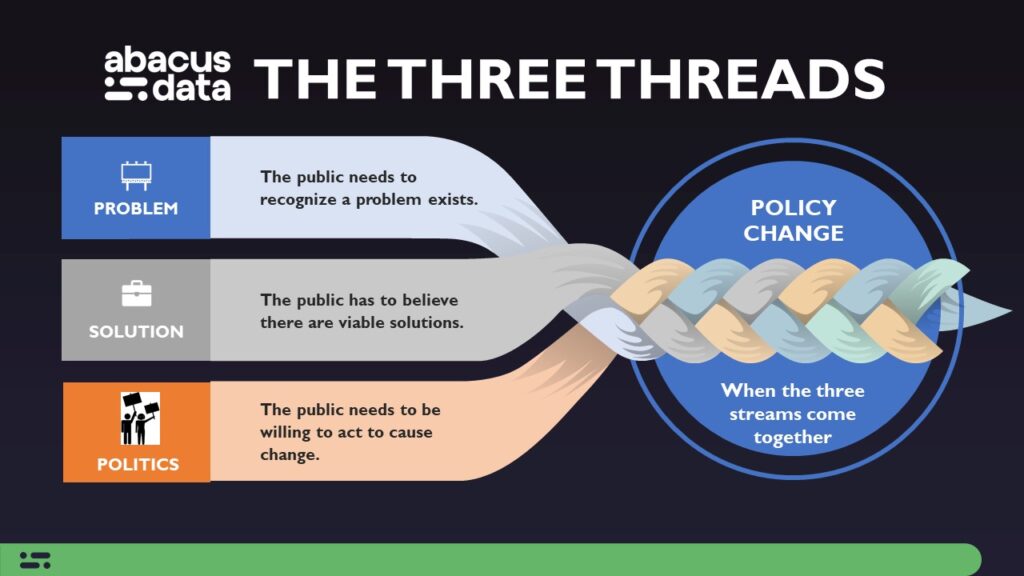
at polling for public affairs and advocacy.
What Should and Would a Poilievre-led Conservative government do?
Back in December, I conducted a survey asking Canadians about their expectations and desires for a hypothetical Conservative government led by Pierre Poilievre. On this latest survey, I revisited these questions. I think these questions can help us understand whether the Conservatives have been successful at setting the agenda, whether its larger coalition today is fundamentally different than the smaller one last spring, and what the Liberals might need to do to make the Conservative seem unacceptable to more people.
First, few Canadians are certain that a Conservative government would do any of the things we tested but they are more certain than anything else they will eliminate the national carbon tax. This was the case in December, and remains the case today.
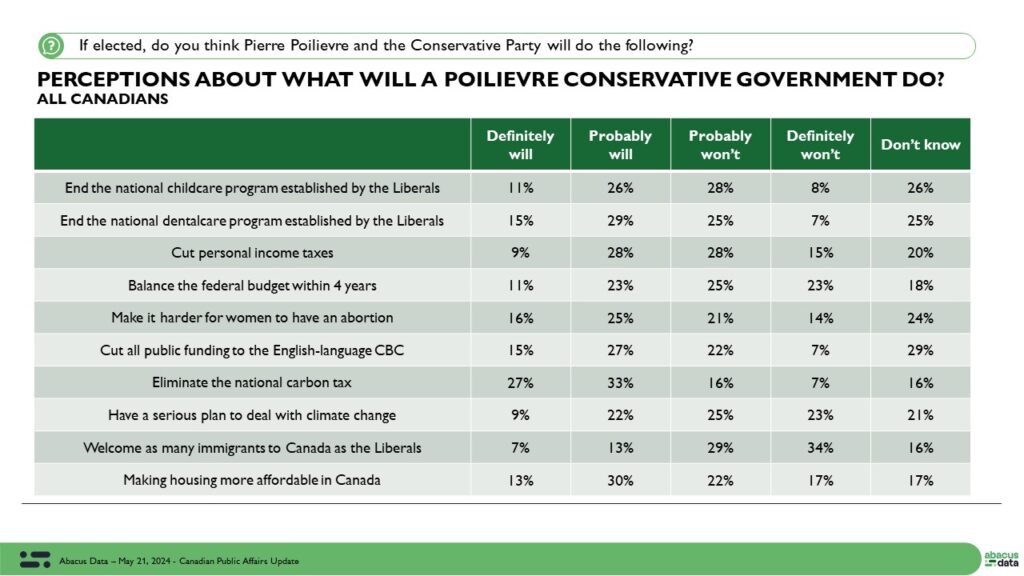
Compared with December, more Canadians now believe that the Conservatives will make housing more affordable (43%, +4), will eliminate the carbon tax (61%, +3), and will end the national dentalcare program (43%, +3). They are also much more likely to believe that the Conservatives, if elected, won’t welcome as many immigrants to Canada as the Liberals (64%, +6).
On the issue of abortion, there hasn’t been a big shift in perceptions about this. 41% of Canadians think a Poilievre-led Conservative government will definitely or probably make it harder for women to have an abortion while 35% think it wouldn’t. Those unsure about this are down 3 to 24%.
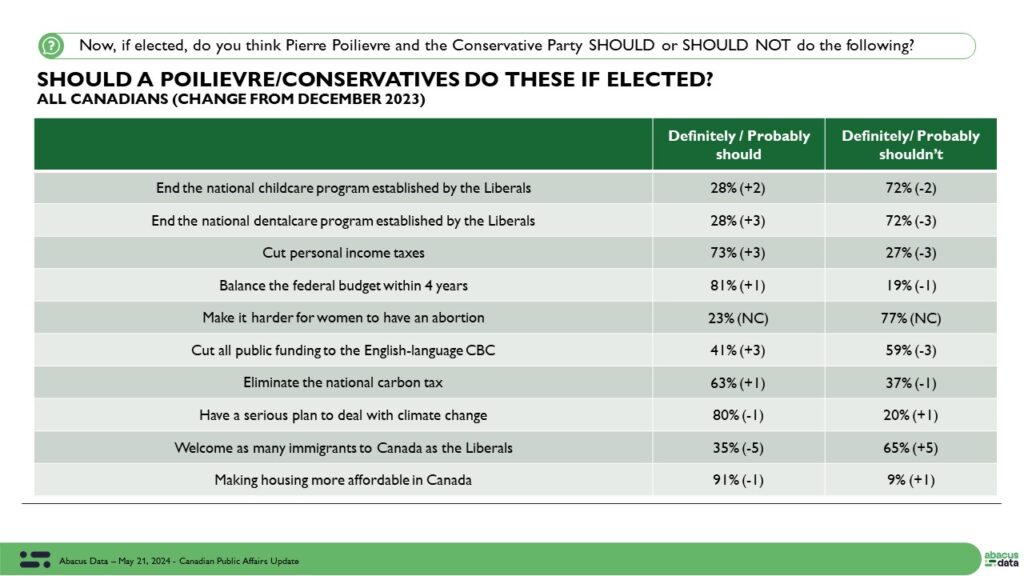
The implication, in my view, is that the Conservatives continued to be effective at agenda setting and their relentless focus on the carbon tax and housing continues to pay dividends. For the Liberals, this data shows that their focus on abortion has not yet changed public perceptions, but there is still room to do.
Especially when we consider the results below – what Canadians think a Poilievre government should do.
In this case, only 23% of Canadians think a Poilievre government should make it harder for women to have an abortion. This is why the Liberals are focused on this issue today. Most Canadians don’t want to see that happen.
Similiarily, most Canadians do not want the Conservatives to end either the national childcare or dental care programs or to welcome as many immigrants as the Liberals have. There is widespread support for making housing more affordable, for balancing the budget, and for cutting income taxes.
Cutting funding to the English-language CBC is also not overly popular. 41% want the Conservatives to do this (up 3) while 59% don’t want them to and current Conservative supporters are split. 60% want them to while 40% don’t.
What about Climate Change?
In this wave of research, 80% of Canadians want the Conservatives to have a serious plan to deal with climate change, including 74% of those who would vote Conservative today. But only 31% think they definitely or probably will and 48% think they won’t up 3-points since December.
Here again is another example of a shield issue for the Conservatives and one that presents risk, especially if the wildfire season continues to be as bad as many predict it will be.
There is little appetite for ending the national childcare or dental care programs, for limiting access to abortion, or to cutting all public funding to the English-language CBC.
What does all this mean?
Overall, these results continue to signal that public perceptions of what a Conservative government would do if elected are not fully formed and the broader coalition of voters that the Conservatives have assembled – in large part because they want change and are rejecting Mr. Trudeau and the Liberals – don’t want them to do things that the core Conservative base may be excited about.
The Conservatives and Mr. Poilievre have been very successful at making it clear there will eliminate the carbon tax and there’s a sense that they will make housing more affordable and reduce immigration numbers. But there’s more confusion and uncertainty on other policy areas.
The Upshot
According to Abacus Data CEO David Coletto: “Last month we had the Liberals trailing the Conservatives by 21-points. Today, it’s 16. That’s not a huge swing but it’s movement, thanks in large part to a shift in vote intentions among younger Canadians. Despite this improvement, it’s still a very difficult environment for the Liberals.
The desire for change is still very high. The Prime Minister’s personal numbers are still near there all-time low, and Mr. Poilievre, while a little less popular than a few weeks ago, has way less people feeling negatively towards him than the Prime Minister.
Beyond the horserace and our usual trackers, the deep dive into perceptions about what a Conservative government will and should do is instructive. It shows both the areas of opportunity and risk for the Conservatives and explains why the Liberals are trying to focus attention on abortion, rather than on carbon pricing, housing, or taxes. We will reask these questions in a few months to see if anything changes.”
Methodology
The survey was conducted with 2,415 Canadian adults from May 16 to 21, 2024. A random sample of panelists were invited to complete the survey from a set of partner panels based on the Lucid exchange platform. These partners are typically double opt-in survey panels, blended to manage out potential skews in the data from a single source.
The margin of error for a comparable probability-based random sample of the same size is +/- 2.0%, 19 times out of 20.
The data were weighted according to census data to ensure that the sample matched Canada’s population according to age, gender, educational attainment, and region. Totals may not add up to 100 due to rounding.
This survey was paid for by Abacus Data Inc.
Abacus Data follows the CRIC Public Opinion Research Standards and Disclosure Requirements that can be found here: https://canadianresearchinsightscouncil.ca/standards/
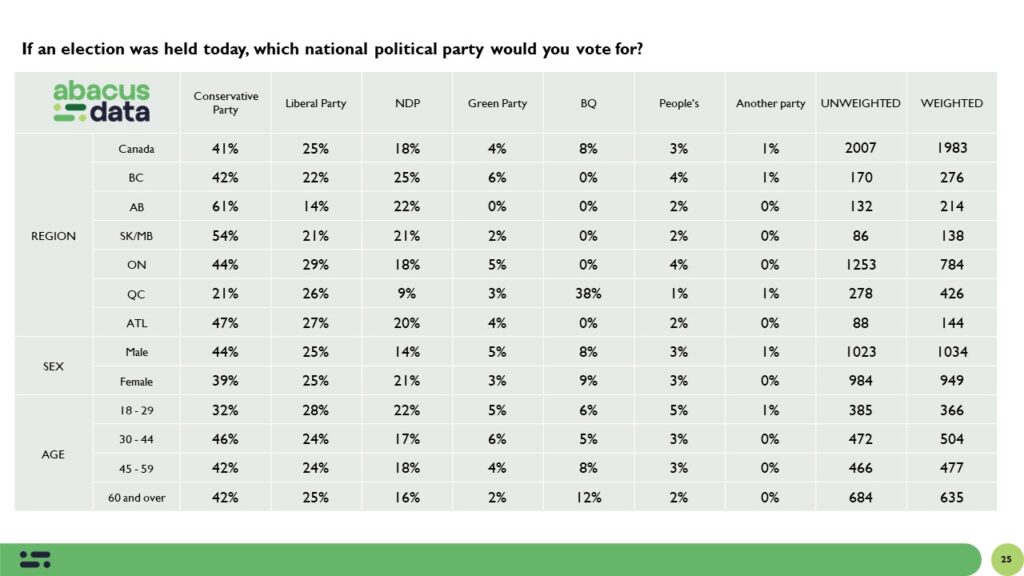
ABOUT ABACUS DATA
We are Canada’s most sought-after, influential, and impactful polling and market research firm. We are hired by many of North America’s most respected and influential brands and organizations.
We use the latest technology, sound science, and deep experience to generate top-flight research-based advice to our clients. We offer global research capacity with a strong focus on customer service, attention to detail, and exceptional value.
And we are growing throughout all parts of Canada and the United States and have capacity for new clients who want high quality research insights with enlightened hospitality.
Our record speaks for itself: we were one of the most accurate pollsters conducting research during the 2021 Canadian election following up on our outstanding record in the 2019, 2015, and 2011 federal elections.
Contact us with any questions.
Find out more about how we can help your organization by downloading our corporate profile and service offering.




